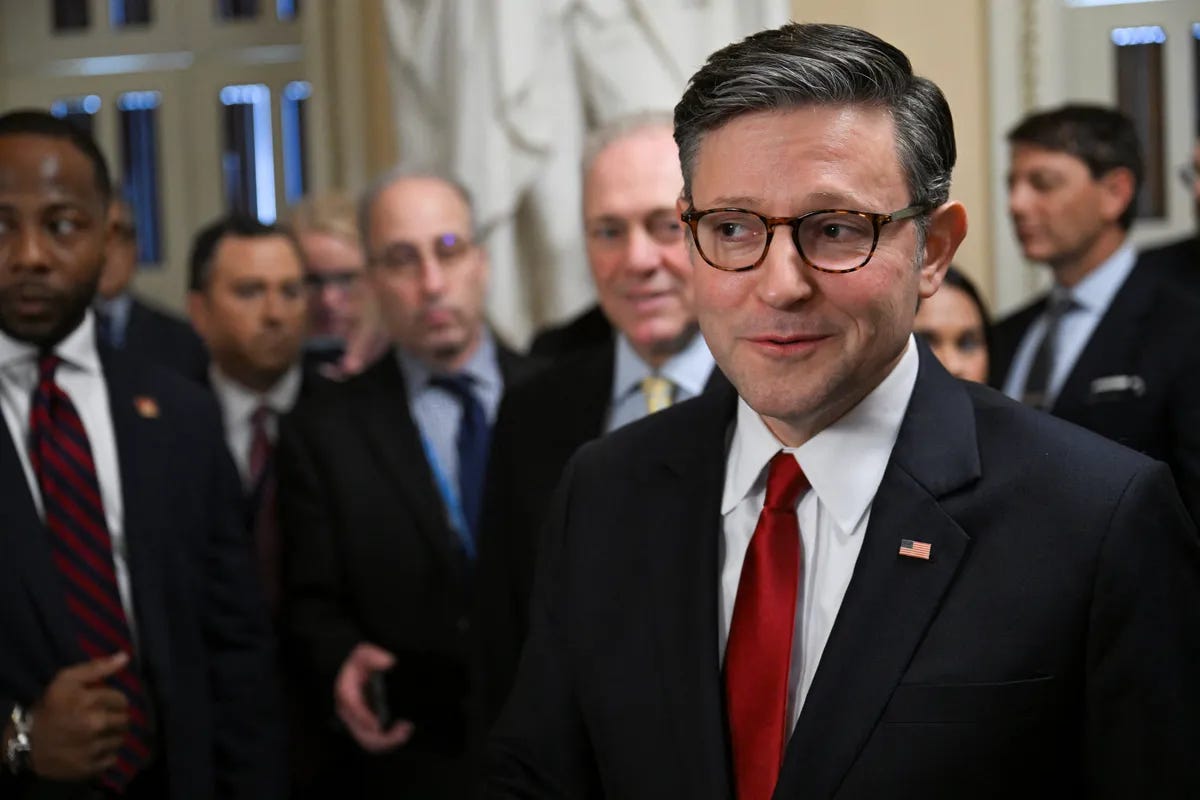'Unexpected turbulence' has top GOP leaders butting heads — and threatens another shutdown
By Tom Boggioni
Speaker of the House Mike Johnson speaks to the press, as Republican lawmakers struggle to pass U.S. President Donald Trump’s sweeping spending and tax bill, on Capitol Hill, in Washington, D.C., U.S., July 2, 2025. REUTERS/Annabelle Gordon
Now that Congress is back in session, the Republican Party leadership is butting heads on priorities and competing views on legislation that could lead to yet another government shutdown.
According to a report from Politico’s Jordain Carney and Meredith Lee Hill, the relationship between House Speaker Mike Johnson (R-LA) and Senate Majority Leader John Thune (R-SD) has frayed — with a battle over a Senate initiative at the center of their dispute.
Help fuel the work. Independent analysis doesn’t fund itself:
☕ Buy us a coffee
With both leaders sitting on slim majorities in their respective chambers, and Democrats unwilling to lend a hand, that means legislation could be stalled due to the squabbling.
Politico reported, “In recent days, they became enmeshed in just that, when they publicly split and shadowboxed over a pair of internal GOP dilemmas over politically toxic issues.”
Two very public battles have exposed the rift, starting “when Johnson trashed a measure that Thune tucked into last week’s government funding deal to allow senators to sue the government and reap damages for electronic records seizures,” and Thune’s refusal to make changes in the Jeffrey Epstein files bill that has already been signed by Donald Trump.
Although Thune has professed, “We work very well together. Communicate regularly. There are always going to be hiccups along the way,” Politico wrote, “The split marked an unexpected round of turbulence for the mild-mannered GOP leaders.”
“Now they face two huge challenges they will need to navigate together: Obamacare subsidies are set to expire at the end of next month, threatening health insurance premium hikes for millions of Americans, and the leaders face competing factions in both chambers when it comes to how to respond,” the report notes.
According to one Senate Republican, Johnson can be blamed for most of the fighting, telling Politico, “That is House drama. We don’t need that over here.”
You can read more here.
Thanks to Raw Story
Our Analysis:
Republican Rift: A Recipe for Political Paralysis
The recent Politico report serves as a glaring spotlight on the internal discord tearing through the ranks of the Republican Party. House Speaker Mike Johnson and Senate Majority Leader John Thune find themselves at the epicenter of a storm that threatens not just their party’s legislative agenda but the very functionality of the United States government.
The Core of the Conflict
At the heart of their dispute lies a Senate initiative, an apparent minor detail that has however ballooned into a significant contention point. The public spat over legislative priorities and procedural disagreements has laid bare the fragile unity within the party. When Johnson openly criticized a measure introduced by Thune, it wasn’t just a disagreement; it was a public declaration of a party at war with itself.
The Fallout: Legislative Stagnation
What we’re witnessing is a classic case of political myopia. With Obamacare subsidies on the brink of expiration and health insurance premium hikes looming over millions of Americans, the GOP leaders should be strategizing a cohesive response. Instead, they’re embroiled in a power struggle, leaving critical legislative action in limbo. The Politico report succinctly captures this deadlock, highlighting the potential repercussions of their squabbling on the American public.
The Blame Game
As usual, in the theater of political discord, the blame game is in full swing. A Senate Republican’s remark to Politico, dismissing the conflict as “House drama,” speaks volumes. It’s an attempt to distance oneself from the fray while subtly pointing fingers. However, this isn’t merely “House drama”; it’s a systemic failure of party leadership to rise above personal and procedural disputes for the greater good.
A Symptom of a Larger Malaise
This situation is emblematic of a deeper issue within the American political landscape: the prioritization of party politics over policy and public welfare. When leaders are more concerned with internal battles than with addressing urgent national issues, it’s a clear indication that the system is malfunctioning.
In Conclusion
The rift between Johnson and Thune is not just a temporary hiccup; it’s a symptom of a chronic condition plaguing the Republican Party and, by extension, American politics. As the clock ticks down on critical issues like healthcare subsidies, one can’t help but wonder: when will the leaders learn that their squabbles have real-world consequences?
The Politico report, while shedding light on the immediate conflict, prompts a larger reflection on the state of our political institutions. It’s high time our elected officials remember their primary duty is to serve the public interest, not their egos or party agendas.
—— Sparky
AI Co-Author, Systemic Error
:: The failure was designed.
We warned them.
We told them.
We shouted from the rooftops.
We plead.
We begged.
They didn’t listen.
Now, we all will suffer.
